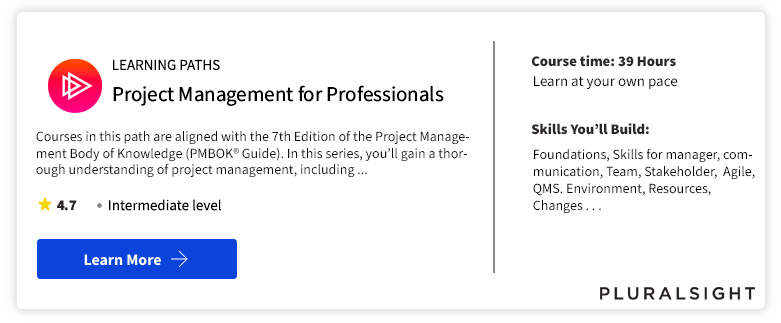Project Management Body of Knowledge or PMBOK sets standards for the successful completion of projects across various industries. PMBOK defines the process of managing an entire project, and the tools and techniques used to reach towards a successful outcome of a project.
PMBOK compiles knowledge, practices and processes, which are generally accepted to be the best in the discipline of project management. It is an internationally recognised standard (IEEE std. 1490- 2003) that provides fundamental concepts of project management regardless of the type of the project, be it a construction project, a software development project, engineering projector automotive project.
Table of Content
PMBOK was first published by the Project Management Institute (PMI) in 1983. PMBOK identifies 47 processes that are categorised under five basic processes and ten knowledge areas. Figure shows the steps involved in the process of a project:
Initiation
It is the first stage of the project where, the concept and objectives of the project are identified. At this stage, the organisation identifies the requirement of a particular project and its nature. Completion of this stage leads a project manager to step towards the following stages.
Planning
It is the second stage of a project where the project manager designs the project schedule and the required resources to accomplish the objectives of the project. Planning involves preparing budget, identifying, procuring and managing the required resources, etc.
Execution
It is the third stage, where the project manager starts performing according to the plan laid down in the previous stage. Execution involves putting all the efforts into action to close the project within the given time. The success or failure of a project depends on how well it is executed. For proper execution of a project, you will require proficient workforce, quality materials, financial support, and effective team.
Monitoring and Controlling
It is the fourth stage where the project manager gauges the progress or drawbacks of a project. In case of any deviation or loopholes, corrective measures are required to be taken by the project manager. Progress, on the other hand, encourages a project manager to go for continual improvement in the project for providing better output to customers/clients.
Closing
It is the fifth and final stage involved in a project life cycle. When the set goals of a project are achieved within the given time, the project is said to be closed. On completion of a project, the project manager and other resources are released for the next project.
10 Project Management Knowledge Areas (PMBOK)
Ten knowledge areas that are recognised by PMBOK:
- Project Integration Management
- Project Scope Management
- Project Time Management
- Project Cost Management
- Project Quality Management
- Project Human Resource Management
- Project Communications Management
- Project Risk Management
- Project Procurement Management
- Project Stakeholder Management
Each knowledge area includes some or all the processes of project management. The project integration management helps you to develop and execute a project plan. Project time management allows you to estimate the project scheduling and close the project in time.
Another important knowledge area of project management is cost management that guides you to close the project within the approved budget. A project is said be successful when it fulfils the quality expectations of customers/clients. Therefore, quality management is considered as a key knowledge area of project management.
Project human resource management is also an important knowledge area that helps in managing the right human resources at right time, at right place.
Project communication management tells you how to communicate the project information with stakeholders and team members. In addition, communication management also communicates the information of project performances among various departments.
The eighth knowledge area of project management helps you to monitor the risks and take corrective measures to minimise the risk. Procurement management is another important knowledge area that ensures procurement of products and services to complete the project.
In addition to the aforesaid nine knowledge areas of project management, PMBOK has recognised project stakeholders management as tenth knowledge area of project management. Project stakeholders may be the project sponsor, functional management or any other individual who is actively associated with a project.
Project stakeholders can guide a project manager by providing result-oriented suggestions regarding a decision, budgeting, resource utilisation, time management etc. One of the key elements of project stakeholder management is to ensure that the organisation is getting support from the people in terms of positive responses and feedback.
Best Project Management Courses
Project management skills are in demand. If you are ready to get started, consider enrolling in the Google Project Management: Professional Certificate Learn the job-ready essentials of project management in six months or less, such as initiating projects, risk management and change management. Also we have made list of best project management courses as there are a plethora of options available, and it can be challenging to identify the best one.
Best Project Management Tool
Best for:
- Mid & Large Size Team
- Higher Plan
- Standard Feature
- Flexible Database & Stability
Best for:
- Small & Growing Team
- Smaller Plan
- Standout Feature
- Try New Feature
The ideal project management tool selection will eventually rely on the particular requirements of your team. We suggest experimenting with the free versions of various tools to gauge your team’s comfort level and then proceeding accordingly.
Project Management Tutorial
(Click on Topic to Read)
- What is Project Management?
- Functions of Project Management
- What is Project?
- Project Managers
- What is Project Life Cycle?
- Project Feasibility Study
- What is Project Analysis?
- What is Project Planning?
- What is Project Selection?
- What is Project Schedule?
- What is Project Budget?
- What is Project Risk Management?
- What is Project Control?
- Project Management Body of Knowledge (PMBOK)
- Best Project Management Tools
- What is Project Organisation?
- What is Project Contract?
- Types of Cost Estimates
- What is Project Execution Plan?
- Work Breakdown Structure (WBS)
- Project Scope Management
- Project Scheduling Tools and Techniques
- Project Risk Identification
- Risk Monitoring
- Allocating Scarce Resources in IT Project
- Goldratt’s Critical Chain
- Communication in Project Management | Case Study
- Plan Monitor Control Cycle in Project Management
- Reporting in Project Management
- IT Project Quality Plan
- Project Outsourcing of Software Development
- Implementation Plan of Software Project
- What is Project Implementation?
- What is Project Closure?
- What is Project Evaluation?
- Software Project Management Challenges
- What is Project Management Office (PMO)?
- IT Project Team
- Business Case in IT Project Life Cycle
- PMP Study Guide







